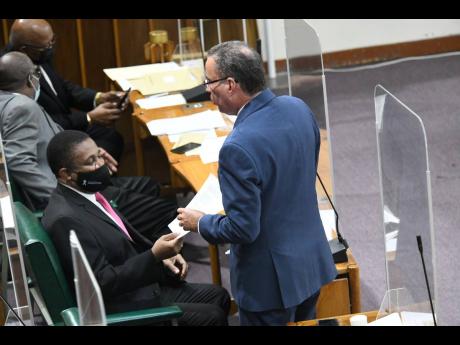$3b computer bill
55,000 devices to be distributed to students, teachers this fiscal year
The suspension of face-to-face classes in the advent of the coronavirus pandemic has cost the Government a whopping $3.3 billion for the procurement of electronic devices for online classes, Technology Minister Daryl Vaz reported on Tuesday.
Collectively, 81,000 electronic devices have been distributed to public-school teachers and students, with an additional 36,000 students being assisted with the purchasing of devices.
A breakdown of the figure showed that 40,000 tablets were procured at a cost of $982 million for students on the Programme of Advancement Through Health and Education (PATH), the state welfare vehicle. An additional 26,000 tablets were purchased at a cost of $809 million for teachers in public schools, while 15,000 laptops were acquired at a cost of $1.3 billion for students on PATH.
Some $720 million was earmarked for the Own Your Own Device initiative to assist 36,000 students to purchase a device.
Vaz told Parliament that the initiatives amounted to more than $3.3 billion in the last financial year and that the expenditure is expected to continue, as face-to-face classes remain on hold.
The Ministry of Education is targeting a vaccination rate of at least 65 per cent of students before it facilitates a resumption of face-to-face classes.
But only 40,000 students have so far received their first dose of the Pfizer vaccine, the only COVID-19 vaccine approved for children 12 years and older.
The health ministry, earlier this month, halted the administering of the vaccine amid uncertainties about future shipments.
Some 82,000 Jamaicans, including children, who received their first dose of the Pfizer vaccine and are now due a second remain in the dark on when they will receive those shots.
As a result, the procurement of devices is expected to continue into this financial year, with plans to acquire 5,000 laptops for teachers. This is expected to cost the Government $400 million.
Vaz said an additional 55,000 devices will be distributed to students and teachers in this fiscal year at a cost of approximately $2.3 billion.
Meanwhile, he said that the technology ministry is working to develop a comprehensive national broadband strategy, which will look at all the factors that will support the viability of the network.
The national broadband initiative, which is expected to cost US$237 million, is a strategy by Government to achieve universal broadband access, with data showing fixed broadband penetration at 11.65 per cent and mobile penetration at 59.76 per cent.
It is expected to be a key part of the Government’s economic recovery efforts as a result of the negative effects caused by the pandemic.
Vaz said that since May, the International Finance Corporation (IFC) has been assisting the ministry in completing its assessment of the best way to expand, finance, operate and maintain the network.
“So far, stakeholder consultations have been held with regulators, government entities, and private-sector telecommunications and utility providers,” said Vaz.
He said from the consultations, the IFC is expected to provide its recommendation on the best option to ensure that there is a sustainable islandwide, open-access network.
The European Union is also expected to assist with the initiative.
“The goal remains to have not only a truly digital society by 2030 but to have the broadband initiative completed by 2025,” said Vaz.

